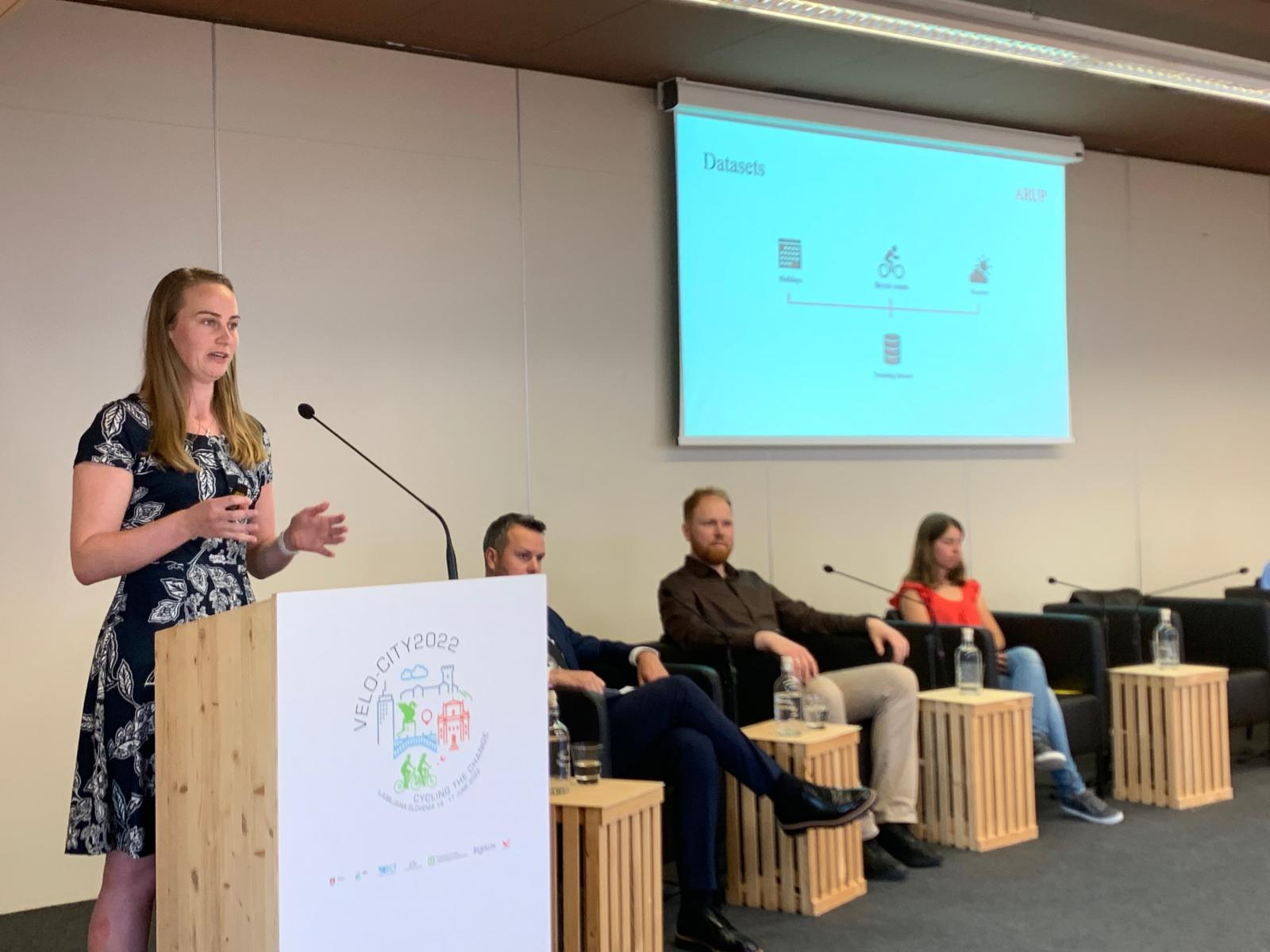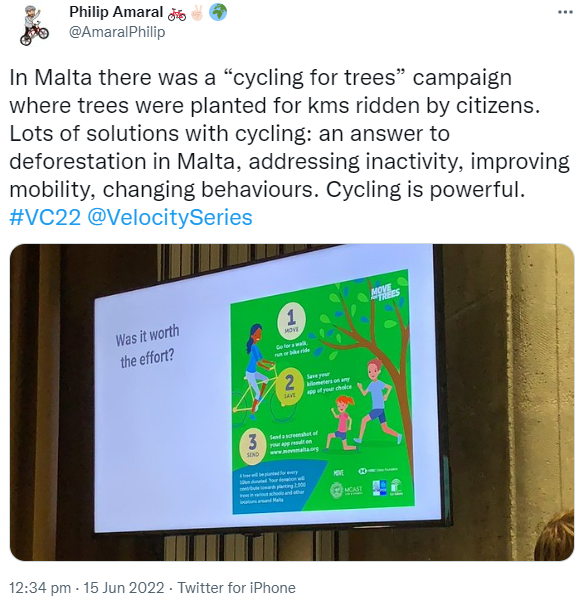
Velo-city 2022 Ljubljana: Wednesday Daily Report – Balkan cities in focus, inequality addressed and city-wide Bike Parade
The sun shone brightly on Day 2 of Velo-city 2022, that saw the Velo-citizens joined by citizens of Ljubljana for the annual Bike Parade. If you missed a session or two whilst in line for ice cream, we don’t blame you! Luckily, we’ve gathered some of the highlights to get you up to speed on another chock-full day of cycling the change.
We are people who care about the end of the world, but we mustn’t forget that there are many who are worried about the end of the month. How do we ensure a just transition?
Sir Graham Watson
ECF Board Member
QUOTE OF THE DAY
Bike Parade
With the sun shining brightly, hundreds of enthusiastic Velo-citizens got on their Ljubljana city bikes and embarked on the traditional Velo-city Bike Parade. Winding their way through the streets of the city and eventually reaching the final destination in the historic centre to enjoy a city-wide celebration put on by our hosts.
Plenary 3: Political Courage for Breakthrough Decisions
The Wednesday morning plenary brought together Mayors of the Balkan region and introduced a “city within a city”, a sustainable recreation initiative from BTC, one of Europe’s largest recreation complexes, in partnership with the city of Ljubljana. The ensuing discussion revolved around the concrete question of: What have mayors done in order to achieve a cycle-friendly culture?
As mayors took the stage, Mayor Zoran Jankovič kicked off the discussion stating, “I always believe that even though Yugoslavia broke apart we are still connected.”
Milosh Vucevic, Mayor of Novi Sad highlighted the importance of sharing best practices in cycling and exchanging knowledge across the Balkan cities. Adding to this, Mayor Mato Frankovic of Dubrovnik stated that “Today, there is no competition, we all learn from each other.” In the case of Dubrovnik, political courage to tackle over-tourism, and by extension implement sustainability measures for more cycling, was needed in abundance to get the city on the right track.
The mayors also spoke to the importance of city administrations leading by example when engaging more people to take up cycling. For example, one measure to facilitate change has given city employees in Banja Luka access to a bicycle subsidy.
The assembled mayors concluded that teamwork and collaboration were key to moving towards more cycling.
Wednesday's session highlights
Over in the green room, representatives of national authorities from across the continent explained strategies to better promote active mobility at the local level by stressing the importance of Sustainable Urban Mobility Plans (SUMPs). These plans help unlock integrated territorial investments which include the construction of new cycle paths, public transport connections and additional soft measures that lead to an overall improvement in both the conditions and modal share of cycling.
Perhaps the most timely session of the entire conference, in light of the surging energy prices across Europe, “Cycling out of transport poverty” provided valuable insight into a range of initiatives and ongoing research into transport inequality. Les Ateliers de l’Audace and MolemB!KE both provided inspiring examples of community projects reaching out to underserved neighbourhoods and attempts to create inclusive bike systems.
The session “Working towards more gender equality” put the spotlight on designing gender-inclusive cities. From Brazil to Turkey, activists, researchers and decisionmakers presented different research and efforts, paving the way toward more gender equality in our cities. "When we talk about women's mobility; the perception of safety and the quality of infrastructure is key. We need a holistic approach to transport planning,” underlined Giulia Grigoli, Dublin Cycling Campaign.
In the red room, five speakers took to the stage to explain how cargo bikes are better placed to tackle curb congestion and reduce emissions than traditional logistics models. While the session presented a host of measures to foster the uptake of cargo bikes, ranging from subsidy schemes to safe parking facilities, all speakers agreed that demoing schemes are key to familiarising citizens and businesses with cargo bikes. As Renaud Sarazzin put it, “testing cargo bikes is a truly accelerating measure.”

Spotlight session: ITS Solutions that make cycling a breeze
Intelligent Traffic Systems were a hot topic just before lunch. Simon Sølvason from the City of Copenhagen, seeking to be the first carbon neutral city in the world (anything to beat the Dutch we expect), is perfecting the now well known ‘Green Wave’ traffic light system for cyclists. No pressing buttons for pedestrians and cyclists stuck at traffic lights; the automated system does it for them.
Meanwhile, Baden-Württemberg is looking to digital solutions to understand cycling patterns, user needs, and map out infrastructure availability. Germany’s federal system means that there are various political levels responsible for the funding and implementation of infrastructure, this project attempts to map out what exists and to help coordinate across implementing authorities.
In the Netherlands, attempts are being made to predict the behaviour of the fair-weather cyclists among us. Imke Lansky, a geospatial analyst from Arup has been using the weather to predict cyclist numbers and thereby facilitate parking and traffic flow requirements in Scheveningen. Using sensing loops to detect cyclists at various locations they can get a real-time count and then compare this data to a weather model.
Does intelligent necessarily have to mean digital? Niko Palo from Ramboll, Finland is tired of being a slave to his GPS mapping app. Wanting to go back to using good old-fashioned signs and let cyclists enjoy what they do best and just ride, his work is dedicated to developing efficient signage to help point cyclists in the right direction.
Plenary 4: Focus on Citizens, Stakeholders and Community
The day’s final plenary saw five female leaders convene on stage to discuss how to push the cycling movement forward whilst taking others with us on the journey.
First, we were given an inspiring overview of all the work being done by Edwin Heskers and EIT Mobility to engage with youth, women and marginalised groups so that “cities are for you, for us and everyone who lives in them.”
Joining moderator Saskia Kluit Dutch Senator, and former CEO of ECF Member Fietsersbond, on stage were CEO of People for Bikes Jenn Dice, ECF CEO Jill Warren, Director of the Brazilian Cyclists’ Union Ana Carboni and ECF Members ADFC and Cycling UK’s CEOs Ann-Kathrin Schneider and Sarah Mitchell.
Discussion revolved around what needs to be done to actually enact change and harness the increasingly widespread desire for safer cycling and solutions to the climate crisis. Ann-Kathrin Schneider passionately argued for people power to conquer the streets with mass bicycle demonstrations. A simple yet effective method to make cyclists’ voices heard by decisionmakers.
Echoing Schneider’s proposal for increased cooperation with the climate movement, Jill Warren rightly highlighted the importance of also engaging with stakeholders at the highest political levels. She cited ECF’s COP26 Open Letter campaign as an example of what united civil society cycling voices can do when working in a coordinated manner.
Cycling UK returned to the Velo-city stage with CEO Sarah Mitchell urging us to avoid polarization and how, with recent political support in the UK for cycling, the focus has now shifted towards behaviour change projects.
In the end we all share CEO Jenn Dice’s desire for “cycling to be ubiquitous” and it’s here at Velo-city where there is “there is so much inspiration and leadership” that the solutions and partnerships can be found.
The best of the rest
All attendees of #VC22 have received a copy of the pioneering new book, Movement, which argues for a deep rethinking of how we use our streets and put people at the centre of urban design. Authors, the journalist Thalia Verkade and Prof. Dr. Marco te Brömmelstroet, University of Amsterdam, spoke on the Freewheel stage about their work and signed copies.
A message from the world of sports was also conveyed on the Freewheel stage today, with elite and recreational sports cycling bodies outlining their commitments to supporting bicycle advocacy and cycling for all.
Fun zone
Introducing ECF Awards 2022
This year ECF will be crowning four winners with the aim to promote best practices in cycling, highlight key successes across the world of everyday cycling.
-
Cycling Infrastructure Award, kindly sponsored by Arup “We shape a better world”
-
Road Safety Award, kindly sponsored by Geveko Markings “Marking the future with you.”
COMING UP ON DAY 3...
-
It’s tourism day! Plenary 5 is all about the power of cycling tourism to foster sustainable development and other sessions will explore innovation in this sector.
-
Plenty of panel discussions on urban cycling innovation and topped off with an all-star plenary on the topic.
-
Finally, don’t forget to join us for the inaugural ECF Awards and Velo-city Dinner taking place at the stunning Ljubljana Castle at 20:00.
FURTHER READING
-
Velo-city 2021 Ljubljana: Tuesday Daily Report – Cycling the Change
-
Official Velo-city 2022 website: discover the full conference programme including social events happening around the city!

